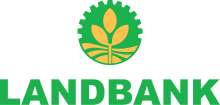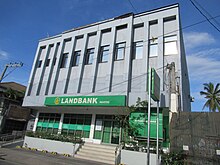
The Bangko Sentral ng Pilipinas is the central bank of the Philippines. It was established on July 3, 1993, pursuant to the provision of Republic Act 7653 or the New Central Bank Act of 1993 as amended by Republic Act 11211 or the New Central Bank Act of 2019. The principal author was Senator Franklin Drilon. It was signed by President Rodrigo Duterte.

The Development Bank of the Philippines (DBP) is a state-owned development bank headquartered in Makati, Philippines.
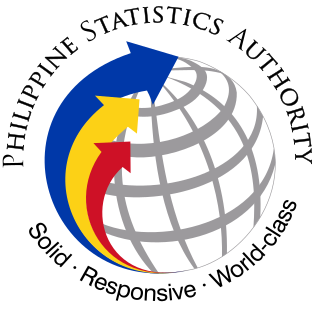
The Philippine Statistics Authority is the central statistical authority of the Philippine government that collects, compiles, analyzes, and publishes statistical information on economic, social, demographic, political affairs, and general affairs of the people of the Philippines, as well as enforcing the civil registration functions in the country.
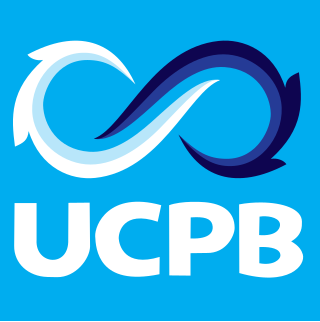
The United Coconut Planters Bank, more popularly known by its initials, UCPB, or by its old name, Cocobank, was a government-owned bank and was one of the largest banks in the Philippines, ranking within the top twenty banks in the country in terms of assets. It was the only existing universal bank not listed on the Philippine Stock Exchange. The bank, owing to its name, catered heavily to coconut farmers, but also served a wide-ranging clientele.

The National Economic and Development Authority is an independent cabinet-level agency of the Philippine government responsible for economic development and planning. It is headed by the president of the Philippines as chairman of the NEDA board, with the Secretary of Socioeconomic Planning as vice-chairman. A number of Cabinet members, the Governor of the Bangko Sentral ng Pilipinas, the Chairperson of the Metropolitan Manila Development Authority, the Chief Minister of Bangsamoro, the Secretary of Information and Communications Technology, the Chairman of the Subic–Clark Area Development Corporation, and the National President of the Union of Local Authorities of the Philippines are members of the NEDA Board.
The Interim Batasang Pambansa was the legislature of the Republic of the Philippines from its inauguration on June 12, 1978, to June 5, 1984. It served as a transitional legislative body mandated by the 1973 Constitution as the Philippines shifted from a presidential to a semi-presidential form of government.
The Constitution of the Philippines is the constitution or the supreme law of the Republic of the Philippines. Its final draft was completed by the Constitutional Commission on October 12, 1986, and ratified by a nationwide plebiscite on February 2, 1987.
The Philippine Guarantee Corporation is the Philippines export credit agency providing trade finance. It is setup as a government-owned and controlled corporation attached to the Philippines Department of Finance. Formerly known as the Philippine Export-Import Credit Agency or PhilEXIM, it is the principal agency for State Guarantee Finance of the Philippines. The primary objective is to perform development financing roles through the provision of credit guarantees in support of trade and investments, exports, infrastructure, energy, tourism, agricultural business, modernization, housing, micro-enterprises, small and medium-sized enterprises and other priority sectors of the economy, with the end in view of facilitating and promoting socio-economic and regional development.

The Philippine Deposit Insurance Corporation is a Philippine government-run deposit insurance fund. It was established on June 22, 1963, by Republic Act 3591. It guarantees deposits up to ₱500,000. The primary function of PDIC is to protect small investors/depositors and build strong confidence in banking. PDIC receives guidance from the International Association of Deposit Insurers.
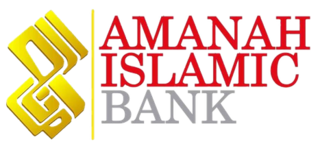
The Al-Amanah Islamic Investment Bank of the Philippines or Al-Amanah Islamic Bank is the first and only Islamic bank in the Philippines.
The Comprehensive Agrarian Reform Program, more commonly known as CARP, is an agrarian reform law of the Philippines whose legal basis is the Republic Act No. 6657, otherwise known as the Comprehensive Agrarian Reform Law (CARL), signed under the administration of President Cory Aquino. It is the redistribution of private and public agricultural lands to help the beneficiaries survive as small independent farmers, regardless of the “tenurial” arrangement. Its goals are to provide landowners equality in terms of income and opportunities, empower land owner beneficiaries to have equitable land ownership, enhance agricultural production and productivity, provide employment to more agricultural workers, and put an end to conflicts regarding land ownership.

The Overseas Filipino Bank (OFBank) is the state-owned digital-only, branchless bank in the Philippines. Formerly known as the Philippine Postal Savings Bank (PPSB) or PostBank, it is the smallest of the Philippines' three state-owned banks, and is the 16th largest thrift banks in terms of assets. Its services are catered to the needs of Overseas Filipinos (OFs), Overseas Filipino Worker (OFWs), and their families or beneficiaries. Since 2018, it has been a subsidiary of LandBank.
The Coco Levy Fund Scam was a controversy in the 1970s and 1980s in the Philippines involving former President Ferdinand Marcos and his cronies. It was alleged that Marcos, Danding Cojuangco, Juan Ponce Enrile, and others conspired to tax coconut farmers, promising them the development of the coconut industry and a share of the investments, but on the contrary used the collection fund for personal profit, particularly in the purchase of United Coconut Planters Bank (UCPB) and a majority stake in San Miguel Corporation (SMC), to name two.
In the Philippines, a government-owned and controlled corporation (GOCC), sometimes with an "and/or", is a state-owned enterprise that conducts both commercial and non-commercial activity. Examples of the latter would be the Government Service Insurance System (GSIS), a social security system for government employees. There are 219 GOCCs as of 2022. GOCCs both receive subsidies and pay dividends to the national government. A government-owned or controlled corporation is a stock or a non-stock corporation, whether performing governmental or proprietary functions, which is directly chartered by a special law or if organized under the general corporation law is owned or controlled by the government directly, or indirectly through a parent corporation or subsidiary corporation, to the extent of at least a majority of its outstanding capital stock or of its outstanding voting capital stock.
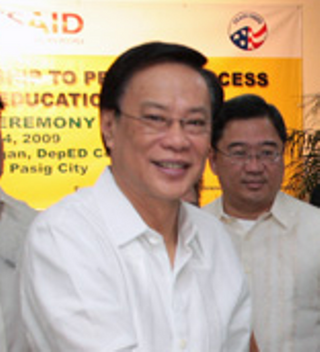
Jesli Aquino Lapus is a former Congressman of Tarlac, former Secretary of Education and uncle of President Benigno Aquino III.
Placido "Cidito" Ledesma Mapa Jr. a Filipino businessman, economist, and government official best known for having served as the second head of the National Economic and Development Authority (NEDA), which is the Philippines' highest economic and development planning body. He was once governor of the Development Bank of the Philippines (DBP). He also held the position of Alternate Executive Director for the Philippines of the International Monetary Fund. He was President of the Philippine Economic Society from 1965 to 1966.
Land reform in the Philippines has long been a contentious issue rooted in the Philippines's Spanish Colonial Period. Some efforts began during the American Colonial Period with renewed efforts during the Commonwealth, following independence, during Martial Law and especially following the People Power Revolution in 1986. The current law, the Comprehensive Agrarian Reform Program, was passed following the revolution and extended until 2014.

Carlos "Sonny" García Domínguez III is a distinguished Filipino businessman who was appointed as Philippine Cabinet Secretary thrice: as Minister of Natural Resources (1986-1987), Secretary of Agriculture (1987-1989), and as Secretary of Finance (2016-2022).

John Rualo Castriciones, also known by the nickname Bro. John, is a Filipino lawyer and writer who served as the Secretary of Agrarian Reform under the Duterte administration from 2017 to 2021. He was formerly Undersecretary for Operations of the Department of the Interior and Local Government from 2016 to 2017. A member of the Philippine Military Academy "Maharlika" class of 1984, Castriciones also served in various capacities under two previous administrations and as a law school professor at his alma mater Arellano University. His appointment to the Agrarian Reform portfolio was approved by the Commission on Appointments on May 29, 2018, after being bypassed earlier by the commission on March 14, 2018, and reappointed by Duterte on March 22, 2018. Castriciones founded the Partido Federal ng Pilipinas together with the Mayor Rodrigo Roa Duterte-National Executive Coordinating Committee (MRRD-NECC).
